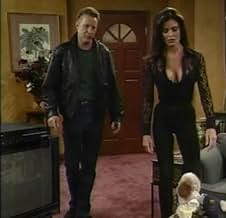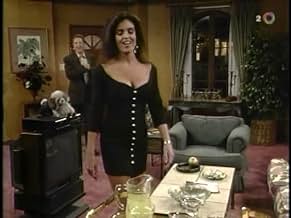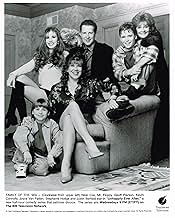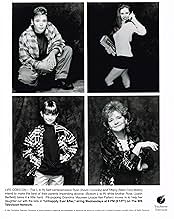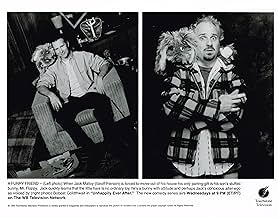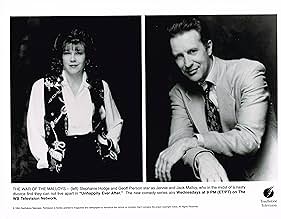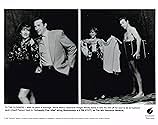NOTE IMDb
6,9/10
3,5 k
MA NOTE
Ajouter une intrigue dans votre langueA not-so-happy family is divided further when the father gets a schizophrenic disorder.A not-so-happy family is divided further when the father gets a schizophrenic disorder.A not-so-happy family is divided further when the father gets a schizophrenic disorder.
- Récompenses
- 3 nominations au total
Parcourir les épisodes
Avis à la une
I have watched a few episodes of this show on late night syndication, and I found myself in the odd position of being intrigued and disappointed at the same time.
The show revolves around the type of family that inhabited pre-"Ally McBeal" Fox Channel shows. We have the stereotypical wife who loves to shop and think illogically. We have the son who can only rely on his hand to console him. We have the daughter who inspires the laugh track to go nuts with wolf whistles just by stepping out onto the stage.
When these characters are around, the show has two modes: predictable and offensive. We see that the son is going to get slapped in the face by the popular girl at school, and we wonder where the humor is in him accidentally killing the mailman (who we find out later is his actual father).
The show takes a slightly more interesting turn, though, in its central character. The father. In other shows, the father has been the most logical figure of the household. He is the one that holds the insanity together. In "Unhappily Ever After", however, the twist is that the father is the crazy one. A couple of times each episode, he sits down on the couch and gets half-assed advice from Mr. Floppy, a hallucination of a stuffed bunny that he had in his childhood.
This part of the show is where I get intrigued. This is an interesting and original idea, with numerous possibilities. Unfortunately, the writers don't know what to do with it, and consequently let the idea become the joke. Mr. Floppy (who is given life thanks to voice-over king Bobcat Goldthwait) has no other purpose in the show than to tell crude jokes and brag about his charm.
It is a shame to see such an idea go to waste. "Unhappily Ever After" had the potential to be one of the most original comedies of the 90's, and instead turned into a cheap and predictable retread of the "Married With Children" formula.
The show revolves around the type of family that inhabited pre-"Ally McBeal" Fox Channel shows. We have the stereotypical wife who loves to shop and think illogically. We have the son who can only rely on his hand to console him. We have the daughter who inspires the laugh track to go nuts with wolf whistles just by stepping out onto the stage.
When these characters are around, the show has two modes: predictable and offensive. We see that the son is going to get slapped in the face by the popular girl at school, and we wonder where the humor is in him accidentally killing the mailman (who we find out later is his actual father).
The show takes a slightly more interesting turn, though, in its central character. The father. In other shows, the father has been the most logical figure of the household. He is the one that holds the insanity together. In "Unhappily Ever After", however, the twist is that the father is the crazy one. A couple of times each episode, he sits down on the couch and gets half-assed advice from Mr. Floppy, a hallucination of a stuffed bunny that he had in his childhood.
This part of the show is where I get intrigued. This is an interesting and original idea, with numerous possibilities. Unfortunately, the writers don't know what to do with it, and consequently let the idea become the joke. Mr. Floppy (who is given life thanks to voice-over king Bobcat Goldthwait) has no other purpose in the show than to tell crude jokes and brag about his charm.
It is a shame to see such an idea go to waste. "Unhappily Ever After" had the potential to be one of the most original comedies of the 90's, and instead turned into a cheap and predictable retread of the "Married With Children" formula.
I'll admit, when I first started watching this show in 1995, I thought that this would be the new MWC once the old MWC went off the air. I mean, look at the similarities......the deadbeat, minimum-wage earning father; the wise-cracking, undersexed mother; a son who dreams of scoring but never does, and a totally hot daughter. There's a few differences, however:
1. The hot daughter is smarter than the boys. She's the straight-A student here. Of course, that doesn't stop her from wiggling around in the shortest skirts possible.
2. There's 2 sons. One combines the undersexed part of MWC's "Bud" character and the dumb part of MWC's "Kelly" character, the other is used primarily for comic relief.
3. Mr. Floppy. The talking bunny is Mr. Malloy's alter ego, and only he can talk to him. Of course, his family thinks he's crazy when he spends all that time in the basement.
4. Tiffany, the hot, short-skirted daughter, is a virgin. When I first heard this, I thought it was the biggest contradiction of the show. Here's a girl that looks this good, with all these guys drooling over her, and she's a VIRGIN? Oh please. As we all know, Kelly Bundy of MWC's favorite spot was the back seat of a car. We didn't see it on camera, but she was understood to be very promiscuous.
After the behind-the-scenes people seen who was watching the show, and who on the show they were watching, first the grandma was let go (after the first season!) and then Stephanie Hodge (who played the mother) was booted off the show. "Unhappily" was restructured around Nikki Cox's character, Tiffany. The show then became an exercise in watching Tiffany and her best friend glide across the screen in the shortest, skimpiest dresses allowed on TV-14 television. I thoroughly enjoyed watching this show, and when it went off the air I was pretty disappointed. The reruns are still around, and I really like watching those! I give this show a solid A.
1. The hot daughter is smarter than the boys. She's the straight-A student here. Of course, that doesn't stop her from wiggling around in the shortest skirts possible.
2. There's 2 sons. One combines the undersexed part of MWC's "Bud" character and the dumb part of MWC's "Kelly" character, the other is used primarily for comic relief.
3. Mr. Floppy. The talking bunny is Mr. Malloy's alter ego, and only he can talk to him. Of course, his family thinks he's crazy when he spends all that time in the basement.
4. Tiffany, the hot, short-skirted daughter, is a virgin. When I first heard this, I thought it was the biggest contradiction of the show. Here's a girl that looks this good, with all these guys drooling over her, and she's a VIRGIN? Oh please. As we all know, Kelly Bundy of MWC's favorite spot was the back seat of a car. We didn't see it on camera, but she was understood to be very promiscuous.
After the behind-the-scenes people seen who was watching the show, and who on the show they were watching, first the grandma was let go (after the first season!) and then Stephanie Hodge (who played the mother) was booted off the show. "Unhappily" was restructured around Nikki Cox's character, Tiffany. The show then became an exercise in watching Tiffany and her best friend glide across the screen in the shortest, skimpiest dresses allowed on TV-14 television. I thoroughly enjoyed watching this show, and when it went off the air I was pretty disappointed. The reruns are still around, and I really like watching those! I give this show a solid A.
Frankly Unhappily Ever After can be considered a guilty pleasure. The show esstentially played out on a trashy level (i.e. in terms of its seemingly inane storytelling) and perhaps the acting had a tendecy of being relatively amateurish. Unhappily Ever After tried to coast as far as it could in terms of references to popular culture and to a certain degree the show benefited from it. Perhaps that was the only thing the show had to fall back on but the references managed to come out on a frequent basis and were fairly interesting never the less. Perhaps Unhappily Ever After can considerably be labled as "low-rent satire." You're viewing something that's can be juvenile on a frequent basis but at the same time will make a fun out of numerous things in popular culture.
Unhappily Ever After is in syndication where I live, and watching it these days, it's clear that while it based itself on Married...With Children, it was also trying to be innovative in how it told its story, how its actors interrelated, and how it treated the show itself.
Obstensibly, the show was about a family of five: a divorced couple, a sexpot daughter, one idiot kid, and one not-so-much an idiot kid. The show however also tended to treat the fourth wall as their urinal, frequently breaking out of character to be themselves, talking to the audience, bringing in studio executives, etc.
This was one of the good points of the show: in one episode, Nikki Cox and Kevin Connolly are faced with having to get rid of the actor who plays Ryan, because he wasn't written into the script and refuses to go away.
The cheesecake factor here is high -- but the cheesecake remembers to laugh at itself quite frequently. The acting for the most part is wooden on Nikki's part, but the actor who plays Jack manages to get the Al Bundy down without all those annoying characteristics Ed O'Neill slowly added to the role.
It's a stupid show, but it's supposed to be stupid, and there are some genuinely funny, and occasionally vicious moments in the show.
Obstensibly, the show was about a family of five: a divorced couple, a sexpot daughter, one idiot kid, and one not-so-much an idiot kid. The show however also tended to treat the fourth wall as their urinal, frequently breaking out of character to be themselves, talking to the audience, bringing in studio executives, etc.
This was one of the good points of the show: in one episode, Nikki Cox and Kevin Connolly are faced with having to get rid of the actor who plays Ryan, because he wasn't written into the script and refuses to go away.
The cheesecake factor here is high -- but the cheesecake remembers to laugh at itself quite frequently. The acting for the most part is wooden on Nikki's part, but the actor who plays Jack manages to get the Al Bundy down without all those annoying characteristics Ed O'Neill slowly added to the role.
It's a stupid show, but it's supposed to be stupid, and there are some genuinely funny, and occasionally vicious moments in the show.
It's true that the show is an obvious Married With Children ripoff. In fact, in one episode I specifically remember Ed O'Neill's (Al Bundy from Married With Children) name being mentioned. Nevertheless, the show is hilarious. Especially Mr Floppy.
Le saviez-vous
- AnecdotesThe show's original theme song's lyrics: "We married young, because of cupid. And had three kids, but we were stupid. She kicked me out, she's not my honey. But she still wants me, when she needs money. Now I'm alone, come rain or sunny. But who needs love? I've got my bunny."
- Citations
Ryan Malloy: My mom and my dad are great. They have two kids. The End.
- ConnexionsFeatured in MsMojo: Top 10 Shows that TOTALLY Ripped Off Better Ones (2018)
- Bandes originalesHit the Road Jack
(1961)
Written by Percy Mayfield
Performed by Ray Charles and The Raelettes
Published by ABC-Paramount
Played in the opening excerpt montage of every episode
Meilleurs choix
Connectez-vous pour évaluer et suivre la liste de favoris afin de recevoir des recommandations personnalisées
- How many seasons does Unhappily Ever After have?Alimenté par Alexa
Détails
- Date de sortie
- Pays d’origine
- Langue
- Aussi connu sous le nom de
- Stephanie Hodge
- Lieux de tournage
- Société de production
- Voir plus de crédits d'entreprise sur IMDbPro
Contribuer à cette page
Suggérer une modification ou ajouter du contenu manquant



